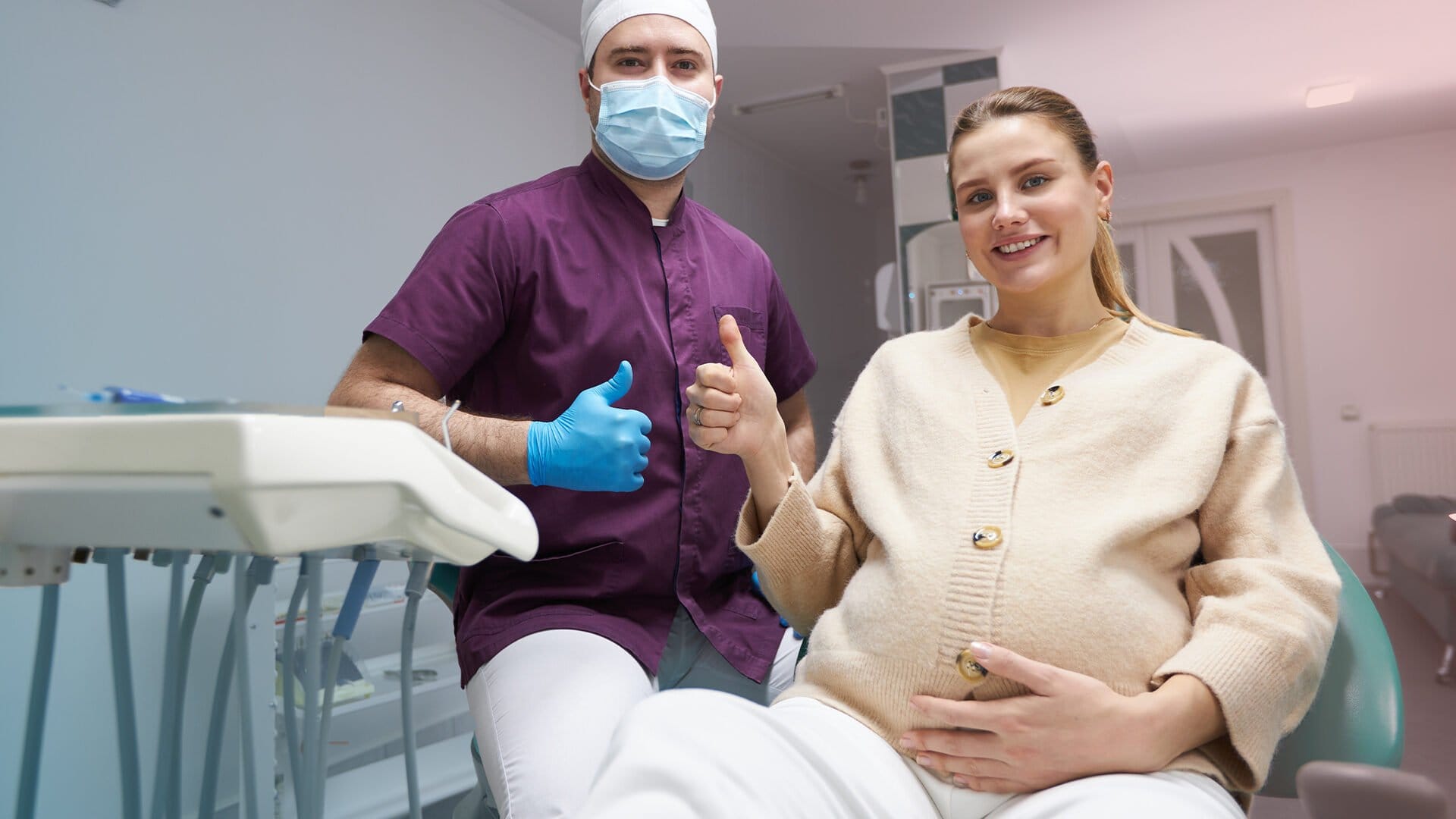Menu
Free Consultation

Oral health is crucial for overall well-being and it not only affects the mouth but also has an integral role in systemic health, quality of life, and social confidence. Good oral hygiene helps prevent dental diseases and provides a pleasing smile with excellent functioning. The importance of oral hygiene increases more during pregnancy when body hormones are altered. Pregnancy increases the risk of several oral health issues, however good dental care during pregnancy can prevent complications. It's very easy to maintain oral hygiene in case of a planned pregnancy. In a planned pregnancy, you have enough time to visit the dentist and use all necessary preventive measures which can prevent gum diseases and dental pain in pregnancy.
During pregnancy, the level of estrogen and progesterone hormones increase which plays a significant role in gum disease progression and affects overall oral health. You can have more bleeding and inflamed gums in pregnancy. Elevated levels of estrogen and progesterone increase blood flow to the gums and make them more sensitive and reactive to plaque buildup. This heightened sensitivity can lead to pregnancy gingivitis which is characterized by red, swollen, and bleeding gum. However, meticulous oral hygiene in the pre-pregnancy phase, the use of fluoride, and good dental health can reduce the chances of pregnancy gingivitis and other gum diseases.
Pre-pregnancy is a crucial phase in planned pregnancy. It's the time when you mentally and physically prepare your body for a beautiful journey of motherhood. So, it's the best time to improve your dental health and have good oral hygiene which will be beneficial for yourself as well as your child. Following are the steps you can take to have good oral health in pre-pregnancy.
In a planned pregnancy you have an opportunity to schedule a thorough dental check-up. It is essential to ensure optimal oral hygiene and prevent gum diseases throughout the pregnancy. The pre-pregnancy dental checkup will help to identify the early signs of gum diseases and tooth decay which can reduce the risks of dental infection in pregnancy. Your dentist will also provide the prophylactic treatment like scaling, polishing with fluoride application on teeth. These procedures will remove the dental plaque and calculus which is the main causative factor of pregnancy gingivitis. In pre-pregnancy dental visits you may require dental restorations and removal of decayed teeth which can cause pain during pregnancy. These preventive measures reduce the chances of dental pain and discomfort during pregnancy. In pre pregnancy dental care, all routine X-rays can also be taken which has to be avoided in pregnancy. So it's the best time you can ensure your oral health and have a healthy pregnancy.
These pre-pregnancy dental visits can also help to learn beneficial oral health practices. During your visit your dentist will inform you of oral hygiene practices, including brushing techniques, sugar intake, and other oral habits. Your dentist will also advise the use of fluoride toothpaste and mouthwashes which reduce the chances of dental caries. In pre pregnancy visits you can also get personalized recommendations to maintain excellent oral hygiene, which is crucial for both your and your baby's dental health. Additionally, your dentist may discuss the importance of nutrition and dental health during pregnancy. A balanced diet not only strengthens your teeth and gums but also reduces the risk of tooth decay and other oral health complications. By addressing these factors, you can prevent potential problems and establish a healthy foundation for your future pregnancy.
In planned pregnancy, you have an ideal time to focus on your overall health including your oral hygiene. A steady dental care routine can help prevent issues like gum disease and tooth decay, which may complicate pregnancy. Poor oral hygiene habits increase plaque accumulation on the tooth surfaces which leads to gum diseases. However, keeping a good oral health regime can prevent these complications and help you to have a safe pregnancy. Brushing is another important step of oral health practices. In the pre-pregnancy phase, you should learn the correct way of tooth brushing. There are different recommended techniques for brushing. You can adopt the best one for your dentition. A dentist or hygienist can demonstrate the correct method of brushing teeth. One of the recommended ways to brush your teeth is to hold your toothbrush at a 45-degree angle to the gumline. Use small and circular motions to thoroughly clean the surfaces of your teeth rather than harsh back-and-forth scrubbing. It will remove the food debris and plaque from all the tooth surfaces and reduce the chances of gum diseases in pregnancy. Another important factor in effective brushing is the choice of toothbrush. Always select a soft-bristled toothbrush to gently clean your teeth without irritating your gums. You should brush your teeth for at least two minutes, twice a day. You have to brush once in the morning and once before bed. Using a timer or an electric toothbrush with a built-in timer can help ensure you brush for the recommended duration.
Another important component of oral health practices for a planned pregnancy is the use of dental floss. Flossing effectively removes plaque from areas that your toothbrush cannot reach and reduces the risk of cavities and gum disease. Regular flossing can also help prevent gingivitis and periodontal disease by clearing out bacteria along the gums and reducing the chances of gum diseases. The recommended flossing method is to use a piece of dental floss and gently slide the floss between your teeth. You can also curve it around each tooth in a C-shape to effectively remove plaque from all sides.
A healthy lifestyle in the pre-pregnancy phase can significantly improve your overall well-being and it’s very important for oral health. In pre-pregnancy, you have to reduce sugar intake and focus on a diet abundant in fruits, vegetables, lean proteins, and whole grains. These foods provide essential vitamins and minerals like calcium and vitamin D, which are crucial for the baby's and mother's oral health. Drinking plenty of water throughout the day not only supports overall health but also helps wash away food particles and bacteria from the mouth which cleans the oral environment.
Other than dietary habits, your lifestyle in the pre-pregnancy phase can also influence your dental health during pregnancy. A healthy lifestyle is key to maintaining strong teeth and healthy gums. Avoiding tobacco and alcohol is essential for both your and your baby's health.
Pre-pregnancy is the ideal time to start taking important supplements that will benefit both you and your baby. Fluoride is an important supplement that you can take in pre-pregnancy and during pregnancy. It's a mineral which protects the teeth from acids and reduces the chances of carious decay. It's not only beneficial for your teeth but also important for your baby's dental health. At home, the best way to intake fluoride is the use of fluoride toothpaste. You can also use fluoride tablets and fluoride milk or other products, but it requires a medical specialist consultation. Fluoride supplement intake is also important during pregnancy and in the breastfeeding period. During intrauterine life, fluoride ingested by the mother may influence the pre-eruptive phase by affecting the enamel formation of deciduous teeth. All this is very benefiting to the newborn’s primary dentition. Fluoride can cross the placenta without restriction and is important for a baby's dental health. However, it is essential to consult with both your obstetrician and dentist before starting any fluoride supplementation. These professionals can evaluate your current fluoride exposure, and overall health to determine the dosage of fluoride supplementation.
The pre-pregnancy phase is essential to improve your dental and systemic health. It's the best time to go for a dental visit, have a healthy oral hygiene routine, and use essential fluoride supplements. Steady brushing habits also play an integral role in preventing plaque deposition, tooth decay, and gum disease. All of these can contribute to systemic inflammation and potentially affect pregnancy outcomes. Brushing twice a day with a soft-bristled toothbrush and fluoride toothpaste is recommended to gently remove food particles and harmful bacteria. You should consult a dentist before starting fluoride supplements. Take good care of your teeth before pregnancy. This will protect your smile and help your child's teeth grow strong. All these habits can make your pregnancy comfortable and healthy.
